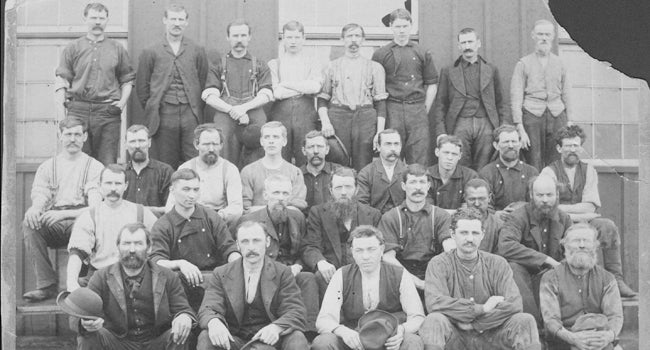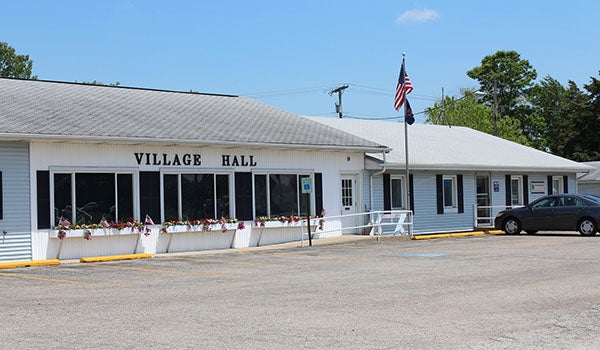Dowagiac 175: P.D. Beckwith, Round Oak and The Industrial Revolution
Published 10:00 am Saturday, April 29, 2023

- P.D. Beckwith and part of the Round Oak Stove Company crew from the 1880s. (Submitted photo)
|
Getting your Trinity Audio player ready...
|
2023 marks the 175th anniversary of the founding of Dowagiac. To celebrate this milestone, Leader Publications – with help from the Dowagiac Area History Museum – will provide readers with a story each month detailing the rich history of the Grand Old City.
DOWAGIAC — The Midwest has always had an economy powered by manufacturing and the City of Dowagiac is no different.
Dowagiac Area History Museum Director Arseneau said that the city’s development increased significantly from 1870 to approximately 1920, coinciding with the rise and height of Dowagiac’s furnace industry.
The furnace boom was spearheaded by Round Oak founder and famed philanthropist P.D. Beckwith, who moved to Dowagiac in 1853 with his wife Catherine. After finding early success with the production of the roller grain drill he invented with a local farmer and inventor named John Gage, he cast himself a heating stove to heat the shop. The stove was of simple design, but it worked well and he continued to tinker with it to improve its efficiency. That initial stove would soon bring the Industrial Revolution to Dowagiac.
A representative from the Michigan Central Railroad Company visiting Beckwith at his foundry saw the stove and ordered one for the depot in Niles. Accepting old iron in exchange for stoves, Beckwith made the Niles depot stove and another for the Kalamazoo depot.
Soon, the Michigan Central ordered over 300 stoves for depots and other buildings along its line. P.D. Beckwith, after years of financial struggles, had finally hit upon a reliable product that proved popular.
Beckwith placed the first commercially available Round Oak stove in the barber shop of Thomas Jefferson Martin, a popular African-American barber in town. He likely reasoned that every man in town would eventually find their way into Martin’s shop and see the stove -— with the hope that some would buy a Round Oak.
An 1870 advertisement lists some of the customers who purchased stoves, and most are Cass County residents or businesses. There are a few customers listed from across the state of Michigan or the Chicago area.
Beckwith incorporated Round Oak in 1871 and the heating stove became his primary product, though he continued making the grain drill. The founding of the stove company led to Dowagiac becoming a small manufacturing hub with products shipped across the country.
“My late friend and local historian Grif Cook always said that without P.D. Beckwith, Dowagiac would have been like Pokagon and Sumnerville,” Arseneau said. “There would not have been true development of a city to have the industry that would continue to grow the town over the next several decades.”
The Round Oak Stove became such a popular item that several copycats sprang up across the country trying to capitalize on its success.
“Round Oak is the original oak stove,” Arseneau said. “You start seeing Acorn Oaks and Royal Oaks and other copycat companies across the manufacturing world of the United States. Round Oak ended up having to sue these companies for infringing on their patents and naming rights.”
Dowagiac would become known as the Furnace City of America as it was home to four furnace companies: Round Oak, Rudy 1914, Premier (1920) and Dowagiac Steel Furnace (1929). In addition, the Dowagiac Drill Company (founded 1881) and Heddon Fishing Tackle (1902) were also industry leaders that called Dowagiac home.
Immigrants came from Europe and African Americans migrated north to settle in Dowagiac and work in the factories. According to Arseneau, at one point in time approximately half of the city’s men were employed by Round Oak. Arseneau said that the city’s development increased significantly from 1870 to approximately 1920, coinciding with the rise and height of Dowagiac’s furnace industry.
“You have really incredible growth in the industry of Dowagiac because of P.D. Beckwith and the Round Oak stove company and then subsequent factories where Dowagiac goes from 1,000 people to 6,000 people over those 30 to 40 years,” Arseneau said.
Beckwith, who recognized that Round Oak’s success relied upon Dowagiac’s fortunes and vice-versa, continually invested in both his company and the city.
He served as an alderman and mayor in the 1870s and 1880s, and was a noted philanthropist in town. Despite his success, he lived in a modest house on High Street — this allowed him to pour his profits into the Round Oak Stove Works and the city.
He approved the organization of the Round Oak baseball team in the mid-1880s and set aside a part of the Stove Works grounds for a ball field. The Round Oak team entertained the city for decades. Beckwith’s wife, Catherine, led the Dowagiac Ladies Library Society and had P.D. build the city’s first library in 1872, which sat on the site of the parking lot next to China Garden until it was torn down in 1962.
P.D. Beckwith died on Jan. 11, 1889, after a brief illness. In 1893, the Beckwith Memorial Building – with the Beckwith Theater inside – opened on Front Street, which the family had built in his honor. Today, Beckwith Park sits on the site and the Beckwith Theater Company uses the family name in recognition of his impact on the city.
“You have a legacy that impacted Dowagiac in a significant way beyond the factory grounds,” Arseneau said.






